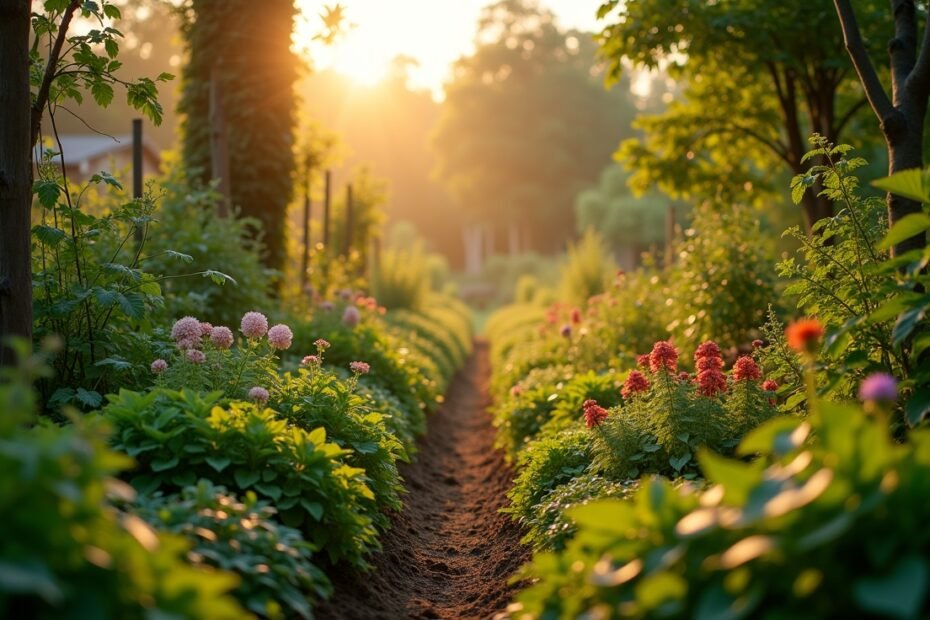Biodynamic gardening is a holistic approach that unites centuries-old agricultural wisdom with today’s sustainable techniques. This method goes beyond organic practices by incorporating natural cycles, lunar rhythms, and biodynamic preparations to enrich the soil and nurture plant health. As modern gardeners seek eco-friendly alternatives that foster biodiversity and sustainability, biodynamic gardening offers a time-tested yet innovative solution.
Principles of Biodynamic Gardening
Biodynamic gardening is rooted in the belief that the farm or garden is a living organism. It relies on natural processes to create a self-sustaining ecosystem, where every element, from soil microorganisms to celestial cycles, plays a vital role.
Traditional Wisdom and Lunar Cycles
A core tenet of biodynamic gardening is its respect for natural rhythms. Gardeners use a biodynamic calendar to plan sowing, planting, and harvesting according to the phases of the moon and planetary positions. This ancient wisdom suggests that lunar cycles influence soil moisture and nutrient availability, ultimately affecting plant growth.
- Lunar Influence:
Plants are often sown during specific moon phases believed to enhance root development and overall vitality. - Biodynamic Preparations:
Special composts and herbal sprays, prepared following traditional recipes, are applied to the soil to boost its fertility and stimulate microbial activity.
Integrating Modern Techniques
While biodynamic methods have deep historical roots, modern technology can enhance their effectiveness. Integrating scientific methods into biodynamic practices bridges the gap between tradition and innovation.
Advanced Soil Management
Modern tools, such as soil testing kits and digital monitoring systems, allow gardeners to measure nutrient levels and adjust biodynamic preparations accordingly. This blend of old and new techniques ensures that soil remains rich in organic matter and balanced in pH.
- Composting Innovations:
Today’s composting methods, including controlled aerobic composting, improve the quality of biodynamic composts by speeding up decomposition and preserving vital nutrients. - Natural Pest Control:
Biodynamic gardens use natural pest repellents derived from herbal preparations. These are complemented by modern techniques like biological controls, which utilize beneficial insects to maintain a balanced ecosystem.
Enhanced Water Management
Efficient water use is crucial in any sustainable garden. Incorporating drip irrigation systems and rainwater harvesting with biodynamic practices helps optimize water distribution and minimize waste. Modern water management ensures that plants receive consistent moisture, aligning with the biodynamic focus on nurturing life in all its forms.
Benefits and Practical Applications
Biodynamic gardening offers tangible benefits that extend from soil health to improved crop quality. When traditional practices meet modern technology, the results can be remarkable:
- Soil Enrichment:
Biodynamic preparations enhance soil structure and microbial diversity, leading to more resilient and fertile ground. - Plant Health:
Gardens managed under biodynamic principles often exhibit stronger, more vibrant plants with improved resistance to pests and diseases. - Enhanced Flavor and Nutrition:
Many gardeners report that crops grown biodynamically taste better and retain more nutrients, a testament to the natural synergy at work. - Sustainability:
By fostering a self-sustaining ecosystem, biodynamic gardening reduces reliance on synthetic fertilizers and pesticides, promoting long-term environmental health.
Case Study: A Thriving Biodynamic Garden
Consider a small community garden that adopted biodynamic practices several years ago. By following a biodynamic calendar and integrating modern soil testing methods, the garden not only increased its yield by 40% but also saw a significant improvement in plant quality and taste. This success story highlights how blending traditional techniques with current innovations can yield impressive results.
Expert Insight
Dr. Helena Moore, a specialist in sustainable agriculture, observes:
“Biodynamic gardening represents a harmonious blend of time-honored practices and modern sustainability. When gardeners honor natural cycles and incorporate advanced techniques, they create ecosystems that are both productive and resilient.”
Her insights, supported by research from organizations such as FAO and USDA, underscore the potential of biodynamic methods to transform contemporary gardening.
FAQ: Biodynamic Gardening
- What is biodynamic gardening?
It’s a holistic gardening method that integrates traditional agricultural wisdom with modern practices to enhance soil and plant health. - How do lunar cycles influence gardening?
Biodynamic calendars use lunar phases to determine optimal planting and harvesting times, believed to improve root growth and plant vitality. - What are biodynamic preparations?
They are specially prepared composts and herbal sprays applied to the soil to boost fertility and stimulate microbial activity. - Can modern techniques be integrated with biodynamic practices?
Yes, tools like soil testing kits, drip irrigation, and natural pest control methods complement traditional biodynamic methods. - What benefits can I expect from biodynamic gardening?
Enhanced soil health, improved plant quality, better flavor and nutrition in crops, and a more sustainable, eco-friendly garden.
Conclusion
Biodynamic gardening seamlessly fuses traditional wisdom with modern innovation, creating a sustainable and enriched environment for plants. This approach not only nurtures the soil and boosts plant health but also promotes ecological balance and long-term sustainability. Explore biodynamic techniques in your garden and experience the transformation of your green space into a vibrant, self-sustaining ecosystem.
Read also: How to Identify & Eliminate Garden Pests: 2025 Organic Guide
